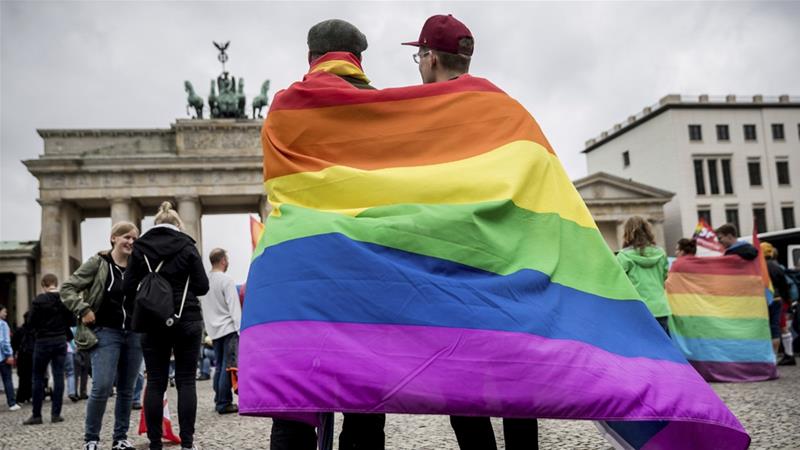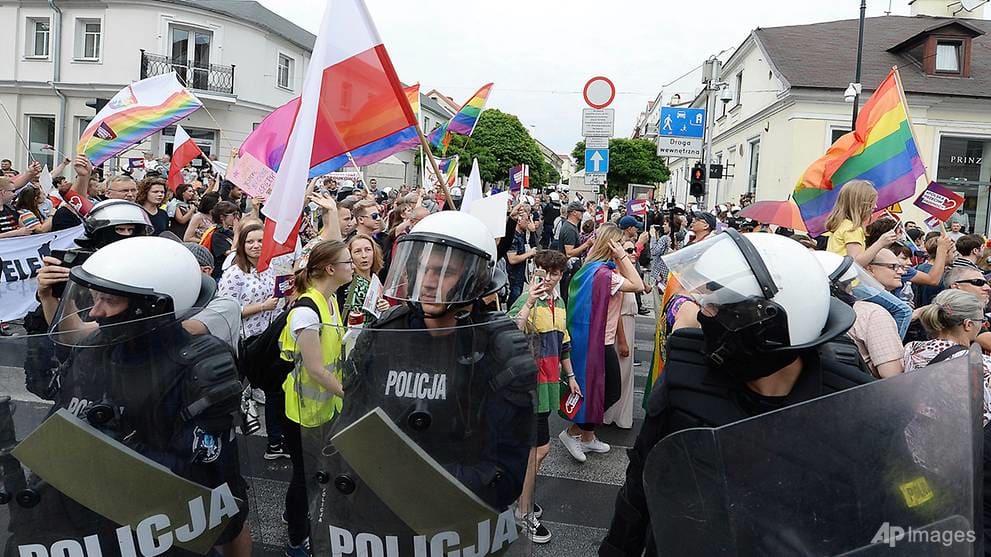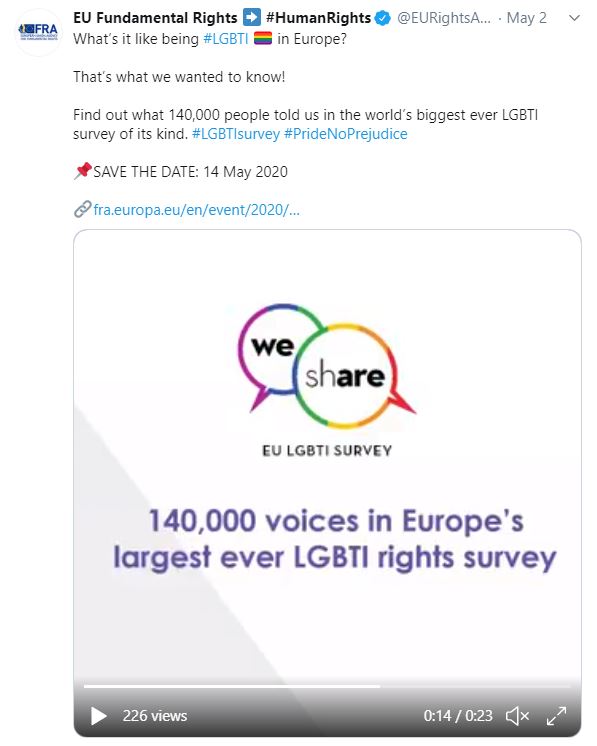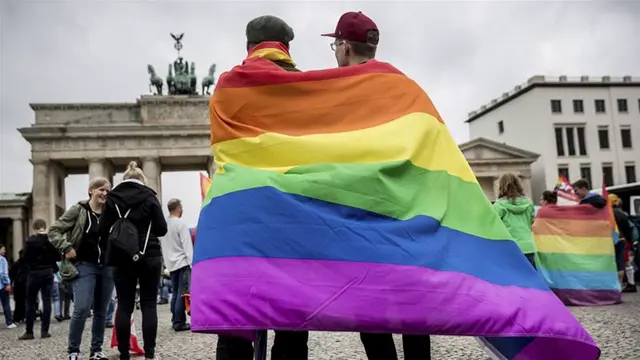
Two men holding a rainbow flag stand in front of the Brandenburg Gate at an event to celebrate the legalization of same-sex marriage in Berlin, Germany, June 30, 2017. /AP
Harassment at work, bullying at school and attacks in public: discrimination and violence against lesbians, gays, bisexuals, trans and intersex people (LGBTI) remain high across the European Union (EU) with many saying they are afraid to show public signs of affection and that police do little to help, according to a major survey published Thursday.
The EU's Fundamental Rights Agency (FRA) surveyed some 140,000 people in all 27 member states, as well as the UK and EU candidates Serbia and North Macedonia, in what it says is the world's largest ever survey of the LGBTI community.
And the results show little improvement from 2012, when it conducted its previous study.
Discrimination in public
In 2019, 53 percent of respondents in the EU-28, including the UK, said they were never or rarely open about being LGBTI. The number was far higher among bisexual men (77 percent) and intersex people (70 percent), and in countries like Lithuania (84 percent) and Latvia (79 percent).
A total of 61 percent said they often or always avoided holding hands with a same-sex partner in public, and 33 percent said they often or always avoided certain locations for fear of being harassed or assaulted.
Over a third of respondents (37 percent) also said they had experienced discrimination in the past year in cafes and restaurants, in shops, when seeking housing and even with social services and healthcare personnel, with the numbers even higher for trans and intersex people.
"I was refused medical care from a nurse at a general practice due to being (trans) and thus making her uncomfortable.I then had to be assigned to another general practice," the report quoted a 22-year-old trans and bisexual woman from the UK.
"Medical care for my health needs is hard to find without discrimination. Therefore, I go to the doctor only in extreme emergencies," added a German intersex person, aged 49.
Staying silent
Worryingly, the vast majority of respondents said they did not report the most recent incident of discrimination, with only 11 percent across the EU doing so. Even in Luxembourg and Italy, where more people reported discrimination, only 19 percent did so.
The reasons given included a lack of trust in the authorities, fear that they would not be taken seriously and intimidation from the perpetrators. Across all 30 states surveyed, 41 percent said "nothing would happen or change" if they were to report an incident, and 33 percent said it was "not worth reporting it – 'it happens all the time'."

LGBT activists and their supporters gather for the first-ever pride parade in the central city of Plock, Poland, August 10, 2019. /AP
This was also the case where violence and harassment were involved. About 11 percent said they had been physically or sexually attacked for being LGBTI in the past five years, with trans and intersex people especially targeted. But just 21 percent reported the incident and only 14 percent did so to the police.
Cases of harassment – far more common and including physical or verbal threats, insults, intimidating behavior, or cyber harassment – stayed hidden even more often, with only 10 percent of respondents reporting an incident in the past five years, and only four percent going to the police.
"Already when receiving my formal complaint, the police made homophobic statements," a 30-year-old gay man from Germany told FRA. "Despite inquiries in the aftermath, nothing happened. That's why I avoided filing complaints in later cases. At the police I felt the homophobia to be even worse than in general society."
Marked differences
The findings varied greatly across the countries surveyed – spanning from Latvia to Portugal, and from Greece to the Netherlands – and between age groups and LGBTI groups.
Of all respondents, those aged 15 to 17 reported being harassed far more than older respondents (47 percent).
Countries like Poland, Hungary, Romania, Lithuania, Latvia, as well as Serbia and North Macedonia, often seen as more conservative, scored consistently poorly in the survey, while others like the Netherlands, Denmark, Sweden, Malta and Luxembourg, generally viewed as more liberal, did better.
But even in the same country, findings could swing wildly. While respondents in Cyprus were among those experiencing the most discrimination at work, they suffered far less harassment in general than their European counterparts.
Meanwhile in France and Belgium, a majority of respondents said they were very or fairly open about being LGBTI, but the two countries were also among those with the most physical and sexual assaults.

Twitter post by the EU's Fundamental Rights Agency (FRA). /CGTN screenshot
Within the LGBTI community, trans and intersex persons reported far more discrimination, harassment and physical or sexual attacks than gays, lesbians and bisexual men and women, as well as a greater fear of going out. In all, 22 percent of intersex persons suffered an attack in the past five years, twice the average for the entire LGBTI community.
From 2012 to 2019
"The results show little progress over the past seven years," FRA Director Michael O'Flaherty noted.
"Even though some countries have advanced LGBTI equality... overall there has been too little real progress, leaving many LGBTI people vulnerable. "
Compared to the 2012 findings, more people felt discriminated at work in 2019 (21 percent, up from 19 percent), and among trans people the jump was even more dramatic, to 36 percent from 22 percent.
Outside the workplace, discrimination and harassment also went up, while the percentage of attacks remained about stable.
Overall, 40 percent of respondents said they thought prejudice and intolerance against LGBTI people had dropped a little or a lot in the past seven years, but 36 percent said it had increased. Among those countries where intolerance and violence were deemed to have risen were Poland and France.
Calls for action
One silver lining was that younger respondents said LGBTI issues were now more frequently discussed in school and they also received more support compared to older respondents.
Far more members of the community were also open now, compared to seven years ago.
At the same time, those deploring a worsening climate pointed the finger at vitriolic rhetoric and a lack of support from politicians, public figures and community leaders, including the church.
Member states need to take steps to ensure the rights of all LGBTI are respected, hate crimes are thoroughly investigated, and legislation is introduced to combat discrimination, FRA urged on the back of its findings. Police officers should be properly sensitized, while schools should provide a safe environment and education about LGBTI issues. Authorities and civil society at large also need to pay special attention to trans and intersex people, who are most often targeted.
With the current pandemic exacerbating economic, social and mental pressures worldwide, things could get worse for the LGBTI community, O'Flaherty warned. "Their job and healthcare difficulties may worsen due to COVID-19. Policymakers should take note and do more to actively promote full respect for rights of LGBTI people."
 简体中文
简体中文

